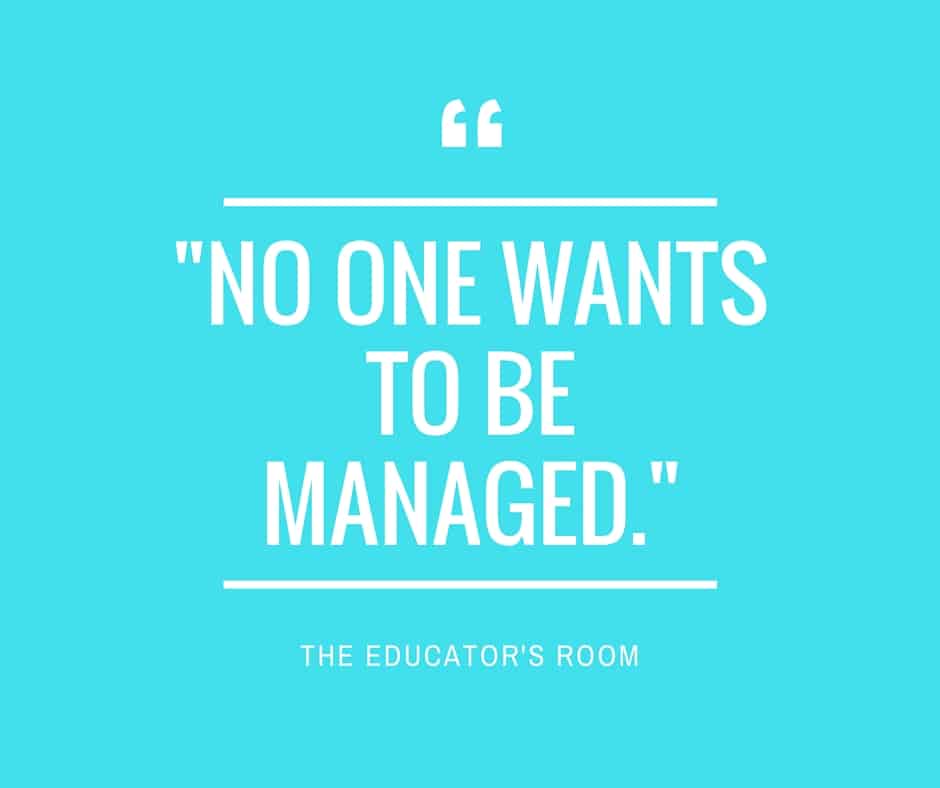Years ago I stopped presenting, coaching and even talking about ‘classroom management’. Who wants to be managed? To be ‘handled’? As an adult, I want to be led. Students want to learn and they want (yearn for) boundaries; AND they want to be led. Creating and adhering to a list of concrete rules and automatic consequences will kill any sense of community in a classroom. Students in these classes turn into one of the following archetypes:
1) the Automaton – the student who blindly obeys every rule for fear of the consequences
2) the Denier – “I didn’t do it!” “It wasn’t me!”
3) the Attorney – “Well, the rule says it’s a detention on the third tardy . . . technically, I wasn’t late yesterday because Mrs. Smith brought me in, so I was excused.
4) the OD – when I was a student I was labeled as oppositional-defiant. I never met a rule I would follow . . . simply because it was a rule.
[bctt tweet=”Who wants to be managed?” username=”EducatorsRoom”]
Have you ever served as a substitute teacher? If you have, you probably have noticed that the teachers who rule with an iron fist with a strict ‘if this- then that’ rule book are the worst classes to sub for. This seems counter-intuitive . . . but not really. If a teacher relies on rules and punitive consequences, the students become conditioned to behaving a certain way, not because it is right, but because they fear retribution.
Classes where the teacher creates a sense of community, are the easiest classes to sub for. The class just hums. The students have learned to simply ‘do the next right thing’. Use kind words; mean words hurt. Pay attention in class; you won’t get lost. Let your friends pay attention in class; otherwise, you are robbing them of their education. Pick up your own garbage; I’ve got a bad back. I had a colleague whose sub plans were usually one line, “Ask Gary to open the class.” That was it. Gary and the class took over from there. Not only was there a sense of community, (there was rarely any need to intervene in a disciplinary situation) but the class was so student-centered, not having the teacher there was not a big deal. The kids knew what to do and were authentically engaged in their learning that they took care of everything.
Before you skeptics snort and say, not my kids . . . Let me explain to you that my teaching experience is in urban high schools. The classes and students I am talking about are tough, poor, diverse and often unmotivated. These same kids might be failing all of their other classes and get behavioral referrals to the office every day . . . from other teachers and other classes.
[bctt tweet=”The classes and students I am talking about are tough, poor, diverse and often unmotivated.” username=”EducatorsRoom”]
As much as I would love to delineate here 5 easy strategies to accomplish this, I cannot. It is not about ‘strategies’ it is a mind shift. A teacher needs to look at her classroom and her kids differently. Here are three of the necessary mind shifts:
1 – Occasions of undesirable student behavior must be considered teaching opportunities. One of my mantras for teachers (both academically and behaviorally) is,”Don’t assume they know what you think they know.” What appears to a teacher to be a rude behavior, might simply be a cultural difference; a manner or cultural norm they haven’t learned yet.
2 – Build empathy, instead of punish, and praise. Punishment doesn’t change behavior. It might stop it, or move it, but it does not teach students what is the right thing to do. If we praise children for a behavior, the research shows that children become less likely to exhibit that behavior unless someone is watching who might praise them for it. Instead, try to build empathy. “Look at his face. Can you see how hurt he is?” Or “ He was hungry before you shared your sandwich with him.Look at how happy he is. You did that!”
3 – What is the behavior you are trying to stop? Everyone needs to move every once in awhile. Yet, some teachers have a ‘do not get out of your seat’ rule. I once asked a teacher why that was one of his 4 rules in her room. He replied, “Because when they get up to throw something out, they knock stuff off of other people’s desks, or bop someone in the head, or distract other students along the way.” My response was, “So, what is the real behavior you need to teach?” The answer is not to prohibit kids from getting out of their seats (although that is certainly the easiest solution for the teacher). It’s to teach and then expect students to move through the room quietly, respecting the teacher, the room and the other students.
If I asked you what do you want for your students? Who do you want them to be when they grow up and have to function in the world? Did anyone answer, “I want them to be non-thinking robots who obey every whim of any authority they encounter?” Or, do you want your students to be contemplative, empathetic, considerate citizens who can serve as a model for others? Our job as teachers is to lead students to the place where they choose to do the next right thing simply because it is the right thing.






